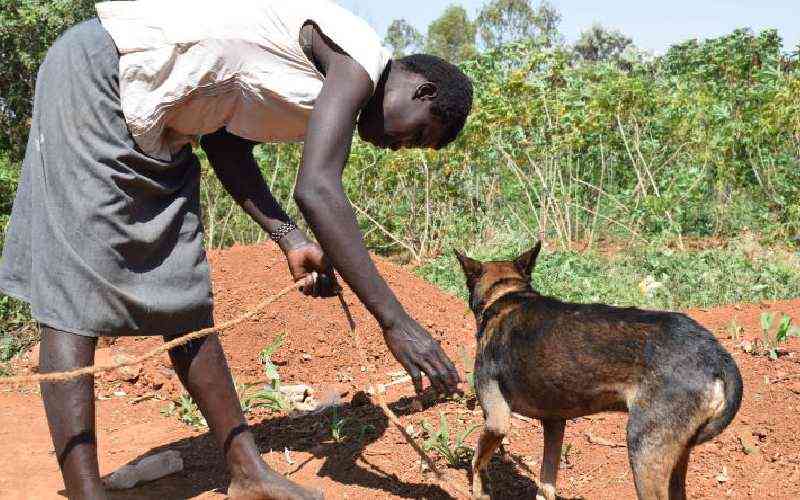
Lilian Atieno at her homestead in Alara village in Bondo, Siaya County. [Mercy Kahenda, Standard]
Lilian Atieno helplessly watched her son, six-year-old Gabriel Okoth, die of rabies at the isolation ward his September.
Gabriel from Alara village in Bondo, Siaya County was attacked by a rabid dog this June on his way back home from a shop.
His mother cleaned the dog bite wound with running water, and rushed him to a herbalist for first aid, before reporting to Kapiyo Health Centre for a Post-exposure Prophylaxis (PEP) vaccine injection.
Gabriel was expected to take four more follow-up jabs but defaulted as the family could not afford transport and the Sh1, 000 for each of the remaining anti-rabies injections.
Two months later, the dog bite wound healed, and the boy began showing signs of the furious form of rabies, then full-blown rabies symptoms including tangling sensation, salivating, hallucinations, fever and fear of water (hydrophobia).
Rabies is a viral disease transmitted from animals mostly dogs to humans through a bite, which inflames the brains and spinal cord.
- KMPDU decries delayed salaries for doctors by counties
- Rabies, a disease dog owners aren't keen on, despite high fatality it poses
- Siaya to improve paediatric ward, hospital morgue
- Family demands answers after child died while being treated in Siaya hospital
Keep Reading
Doctors at the Bondo Sub County hospital could only give him palliative care as rabies has no cure. He died four hours later.
"Had I known the dog bite risked the death of my son, I would have organized a fundraiser, or traded all my property to raise Sh5,000 for the full dose of the rabies vaccine, his death pains," laments a teary Lilian.
Dr Michael Oduor, the Bondo sub-county medical superintendent says by the time of admission, the virus had spread to Gabriel's central nervous system, which progressed to the inflammation of the brain and eventually death.
PEP vaccine was out of stock at the facility, after depleting the 30 vials received in June this year.
"Rabies is a fatal disease once it sets in. In an ideal situation, the vaccine should be given on day one, day three, day seven, day 14 and day 28," says Dr Oduor.
The hospital administers the vaccine at a subsidized cost of Sh500 per dose.
Just like Gabriel, about 2,000 Kenyans die annually from rabies and as Kenya joins the globe to celebrate International Rabies Day on September 28, there is need to enhance awareness as death is inevitable once symptoms set in.
Prof Thumbi Mwangi, an infectious disease epidemiologist co-directing Centre for Epidemiological Modeling and Analysis at the University of Nairobi, says the rabies virus travels from the site of the dog bite through the nervous system to the brain where it is irreversible and results in death.
The first step in managing a rabies bite is washing the wound with clean running water for 15 minutes to wash away virus in the dog's saliva before seeking PEP.
He adds: "Rabies is a neglected disease, and we, therefore, forget about people in rural areas and their health. Even if the vaccine is available, it is not free."
Tom Abala, a research assistant and public health technician, Kenya Medical Research Institute (KEMRI) based in Siaya County, attributed deaths there to lack of vaccines in hospitals, laxity in mass vaccination of dogs, and inadequate sensitization of locals.
Dogs are kept mainly for security and to scare wild animals from destroying crops.
Some locals handle rabies the traditional way; cutting the ears of a 'siwau', (the traditional name of a rabid dog), a practice believed to help shade off rabies biros from the dog.
"It pains me to watch people die of a disease that could be prevented by vaccinating dogs and vaccines, after bites," says Abala.
James Oigo, an animal health technician at KEMRI, estimates that at least three out of four homesteads in Siaya County own a dog, yet "people have not embraced care of dogs. Most are starved, and unvaccinated."
Though the county has been conducting mass dog vaccination, the turnout is low and young boys need to be involved as they're custodians of most dogs.
Prof Thumbi Mwangi, an infectious disease epidemiologist, says there is need for steady supply of rabies vaccine supplies to health facilities besides systematic reduction through sustained mass dog vaccinations.
However, Prof Thumbi is worried that "we are not making speedy progress to achieve 2030 of elimination of human cases of rabies."
 The Standard Group Plc is a multi-media organization with investments in media platforms spanning newspaper print
operations, television, radio broadcasting, digital and online services. The Standard Group is recognized as a
leading multi-media house in Kenya with a key influence in matters of national and international interest.
The Standard Group Plc is a multi-media organization with investments in media platforms spanning newspaper print
operations, television, radio broadcasting, digital and online services. The Standard Group is recognized as a
leading multi-media house in Kenya with a key influence in matters of national and international interest.











